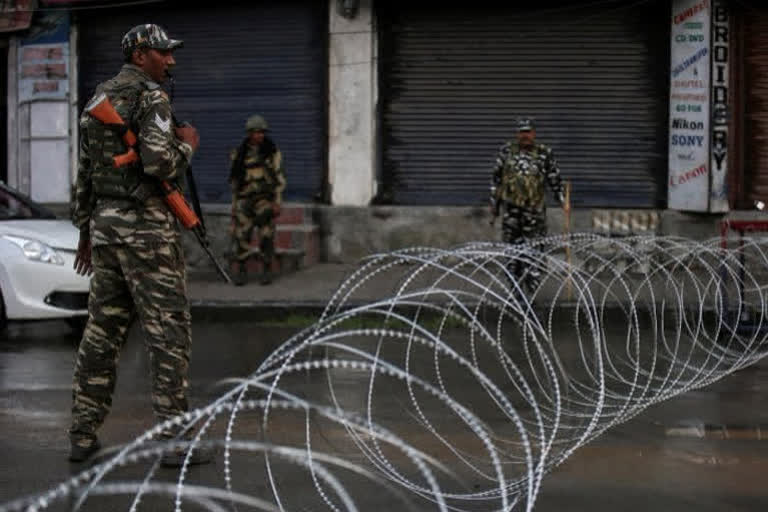Hyderabad: Before the world begins to breathe free again from dangers of unprecedented pandemic, authorities in Jammu and Kashmir are aiming to wipe out the three-decade old armed insurgency. Some drastic changes have been made in the approach to deal with militancy and the support base it has in the entire Kashmir, particularly in the southern part of it.
Ninety one militants have been killed so far ever since the lockdown was imposed to contain the pandemic. Armed forces have carried out 37 encounters during the corona lockdown.
The lockdown began only a month after life had begun to limp back to normal following an equally severe lockdown imposed in the region on August 5, 2019 when the state's semi-autonomous status was cancelled and it was downgraded to two union territories.
The armed forces which had tough time to deal with the political unrest, had now to deal with COVID unrest and simultaneously contain the insurgency as the snow was melting in the mountain ridges in the Himalayas which is the entry route for insurgents aiming to challenge the Indian armed forces.
The south Kashmir's restive districts of Shopian, Pulwama and Kulgam -hotbed of militancy which reportedly enjoy huge public support- alone saw the killing of 22 militants including the 'Chief Commander Operations' of banned Hizbul Mujahideen Riyaz Naikoo.
"The lockdown arrived as a boon to security forces. The people's support to militants is like water to the fish. When you stop water, the fish have to perish," a senior Kashmir watcher told ETV Bharat.
Read: Exclusive: How little Mehrun Nissa's world came crashing down
The timing of lockdown was also important. It is when militants begin to leave the inhabited areas and wander into deep forests. What security forces did is they blocked the transition unlike ever in the past. The security forces made the intentions clear to counter the "Pakistan-backed insurgency" during the lockdown.
"Our strategy to counter-Pakistan is two-pronged, which is to stop infiltration along the Line of Control (LoC) and the International Border (IB) and tackle those who are active in the hinterland, besides stopping local youth from joining terror ranks. Thankfully, we are successful to a large extent in this endeavour," Director General of Police Dilbagh Singh said.
Killing militants is indiscriminate. One of them was killed just a week after his family informed the police that he was missing. Some slain militants carried pistols or grenades.
The security forces also went whole hog against the "eyes and ears" of militants known as "over-ground workers". The DGP puts the number of arrested overground numbers at 240.
LOCKDOWN AND THE NEW BURIAL STRATEGY
The lockdown "offered" another cherished opportunity to security forces to deny bodies of the slain local militants to their families. Since 2008, the funerals of slain militants were the massive exhibition of public sentiment and a major worry for the security establishment.
On every funeral more youngsters were joining the militant ranks during or after the accomplices of the slain militants would appear in the funeral to offer gun salutes.
A massive gathering of mourners at the funeral of a militant in Sopore pocket of north Kashmir in the second week of April amid COVID-19 pandemic was the trigger. The participants in the funeral were dealt with stringently and a new norm--not to allow funerals of militants--was adopted.
The bodies of local militants are now secretly buried in far-off hills in Baramulla and Sonmarg area with or without the presence of two or three close relatives.
This treatment was given to the bodies of foreign militants since 2015 after tens of thousands of people took part in the funeral prayers of Lashkar-e-Tayyeba militant Abu Qasim in Kulgam pocket of south Kashmir. Inspector General of Police, Kashmir Zone, Vijay Kumar said that to keep norms of social distancing in view, police have decided not to allow funerals and handing over bodies of local militants to their families.
HOUSES AS COLLATERAL DAMAGE
Most of the encounters take place inside the residential houses after security forces get inputs about the presence of the militants. The localities are cordoned off and the target houses are usually blown up by Improvised Explosive Devices (IED) to ensure security forces do not suffer casualties.
Visuals of houses blown into pieces are spread to create scare. Recently, in Srinagar's Nawakadal where Hizb’s another top-ranking militant Junaid Sehrai, son of separatist leader Ashraf Sehrai was killed in a gunfight, 22 residential houses were fully or partially damaged.
A week before it, five residential houses were blown up in gunfights in Pulwama town and Beighpora village of Pulwama where HM commander Riyaz Naikoo was killed. Officials said that the houses of locals become a “collateral” and of them only those are compensated by the administration who get a security clearance that militants were not hiding in these houses.
The security forces disallow people to gather around the encounter sites in wake of the COVID-19 pandemic. In the past, massive gatherings around the encounter sites even helped many militants to escape.
Interestingly, the lock down norms for social distancing and travel have been relaxed for the security forces detailed in Jammu and Kashmir.



